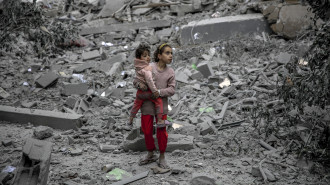
How Israel's war on Gaza is testing Turkey and Azerbaijan's ties

Amid global attention on pro-Palestinian demonstrations across the world, notably on US university campuses, another significant boycott campaign has been brewing in Turkey, albeit against Azerbaijan’s ties with Israel.
Baku’s controversial oil exports to Israel have prompted Turkish activists to stage protests in front of the Azerbaijan State Oil Company’s (SOCAR) Istanbul office over the past six months.
Protesters accuse Baku of fueling the Israeli war machine amid the brutal war on Gaza and demand that Turkey halt the oil flowing to Israel via the Baku-Tbilisi-Ceyhan (BTC) pipeline, which runs from Azerbaijan through Georgia to Turkey's Mediterranean ports, from where it is shipped globally, including to Haifa.
Without Azerbaijani oil, it would likely be extremely difficult for Israel's wartime economy to function as Baku currently meets 40% of its oil demand, which has more than doubled since the beginning of 2024.
The protests peaked on 31 May when an activist group ‘The Thousand Youths for Palestine’ broke the main door of SOCAR’s building and threw red paint on the walls. Protesters carried banners with slogans like ‘Two States, One Betrayal’, referencing the famed motto ‘One Nation, Two States’ that underpins Turkish-Azerbaijani ties.
On 20 June, SOCAR’s office saw another bout of protests when activists waving Palestinian flags threw rocks at the building’s glass windows. While Azerbaijani officials and pro-government media have previously remained silent on these protests to downplay Palestine as a factor in their relationship with Turkey, the 31 May incident evoked strong official and public reactions.
The pro-government media pointed fingers at “Iranian circles” for “trying to tarnish Azerbaijan’s image in Turkey,” a usual scapegoating strategy in such situations, while SOCAR denied direct oil sales to Tel Aviv, asserting that sales occur via trading companies not monitored or controlled by suppliers like SOCAR.
Strained Turkish-Israeli relations and Baku's dilemma
As Israel faces growing international isolation, Baku’s official stance increasingly diverges from Turkey’s. Despite years of efforts on Baku’s part, the Gaza war has left the Israel-Turkey reconciliation process in a precarious state.
After months of tense exchanges, Ankara severed diplomatic ties and announced a total trade embargo on Israel until the Gaza conflict concludes. In contrast, Azerbaijan has ramped up oil exports to Israel and refrained from offering even token criticism of Israel, sharply contrasting with Ankara’s position.
Israeli President Isaac Herzog plans to attend COP29 in Baku in November, and in April 2024, energy ministers from both countries discussed expanding energy cooperation at a meeting in Dubai. This not only undermines the ‘one nation, two states’ narrative domestically but also raises doubts about the nature of the ‘ironclad alliance’ between Turkey and Azerbaijan.
Armenia’s surprise recognition of Palestine, on the other hand, brings both challenges and opportunities for Baku. There are already calls in Israel to increase military support for Azerbaijan in response to Armenia’s move. Israel might now consider selling advanced loitering weapons systems to Azerbaijan, which it previously hesitated to export due to US concerns.
Yet, Baku’s consistent efforts to frame the Nagorno-Karabakh conflict as an Islamic cause within the framework of the Organisation of Islamic Cooperation (OIC), while distancing itself from the ongoing bloodshed in Gaza amid Armenia’s move, expose the hypocrisy in its foreign policy and damage its standing among Muslim-majority nations.
Unlike Armenia, Azerbaijan has not dispatched humanitarian aid to Gaza, despite sending strategic assistance, such as generators and transformers, to Ukraine, in addition to conventional aid, even as a close partner of Russia.
Baku is certainly not happy with this situation, as it puts the country in a difficult quandary, making it hard to navigate the strained relationship between its key ally and strategic partner. It's worth remembering that during the 2020 dispute between Turkey and Greece over gas fields in the East Mediterranean, Azerbaijani President Aliyev pledged unwavering support for Ankara while Israel grew closer to Athens.
Given these pledges, Erdogan likely expects strong backing from Aliyev, especially after Turkey's crucial support in Azerbaijan’s war efforts in Nagorno-Karabakh in 2020. For now, though, Ankara seems to want Baku to be more vocal about Palestine rather than publicly downgrading diplomatic relations or severing trade ties with Israel.
|
|
Baku, however, is cautious even about condemning Tel Aviv while breaking its silence on Palestine. In his recent meeting with Egypt’s Sisi on 8 June, Aliyev called for the establishment of an independent Palestinian state and an end to the Gaza war without mentioning Israel. He specifically noted that Egypt's initiatives "should be taken into account," hinting that Azerbaijan will maintain its profitable trade and diplomatic ties with Israel, much like Egypt does.
Following a meeting between Azerbaijani and Turkish leaders on 10 June, the Turkish side reported that Erdogan discussed "the need for international pressure on Israel to address these crimes," a detail not mentioned in the official Azerbaijani summary, which instead praised the "successful development of fraternal, friendly, and allied relations between Azerbaijan and Turkey".
The strain in Turkish-Israeli relations can also be seen in intelligence issues rather than broader policymaking, which would be more behind the scenes. Notably, when Ankara-Tel Aviv relations became particularly poisoned in 2012, Turkish intelligence disclosed details of Mossad espionage in Iran to their Iranian counterparts, reportedly based in part on their knowledge of the Israeli presence in Azerbaijan.
Iran-Turkey realignment
The Israeli threat has certainly created a geopolitical alignment between Tehran and Ankara over Gaza and Lebanon, which is not a welcoming scenario for Baku. Shared distrust of Iran has been a vital nexus between Azerbaijan and Israel since the establishment of relations. Turkey was already not entirely comfortable with Azerbaijan’s growing hostility towards Iran during the 2022-23 crisis over the so-called ‘Zangezur Corridor’.
At that time, Baku agreed to establish an alternative route to Turkey through Iranian territory rather than Armenia, a plan first declared by Erdogan. Now, as Turkey approaches Tehran, Baku might reevaluate its Iran policy, particularly regarding its use of the ethnic card concerning the sizable Azeri minority in Iran.
Nevertheless, Turkey’s leverage over Azerbaijan is greater than that of Israel, which it can use as the Gaza ceasefire is delayed. First and foremost, Azerbaijan’s major projects, such as the so-called Middle Corridor, are closely interconnected with Turkey, which serves as Baku’s gateway to the West.
Additionally, Turkey is Baku’s primary and only ally in the South Caucasus to counterbalance Russia’s influence.
Most importantly, Ankara’s independent normalisation with Armenia could blow off Azerbaijan's attempts to diplomatically cement its military victory to its advantage. Under these circumstances, Baku hopes for a quick ceasefire in Gaza to avoid further pressure from its key ally.
Rovshan Mammadli is a Baku-based journalist and independent analyst. Holding a BA in Israel and Middle East Studies and an MA in International Policy Studies, he focuses on Azerbaijan’s foreign policy, Middle East politics, and peace and security in the South Caucasus.
Follow him on X: @MammadliRovshan



